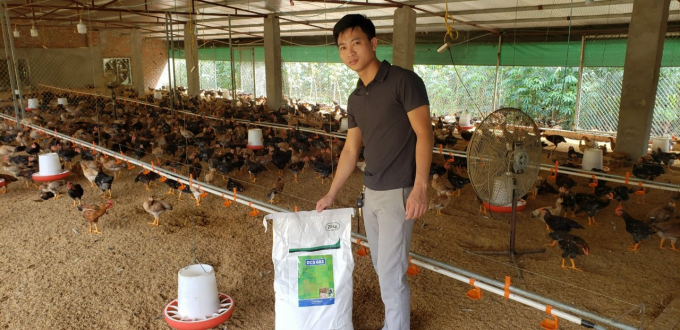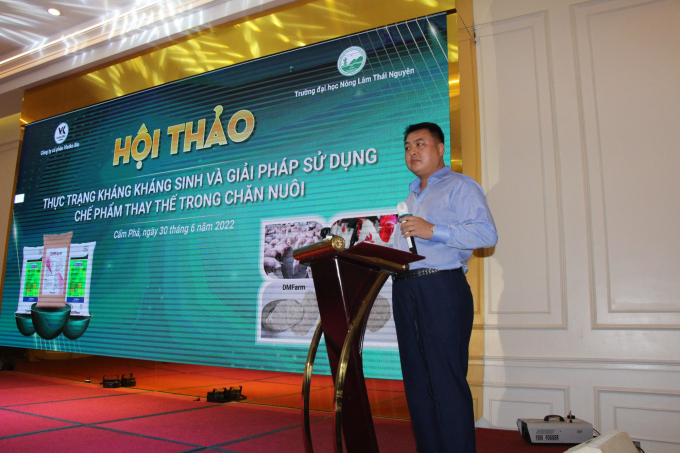November 25, 2025 | 07:44 GMT +7
November 25, 2025 | 07:44 GMT +7
Hotline: 0913.378.918
November 25, 2025 | 07:44 GMT +7
Hotline: 0913.378.918

An alternative to antibiotics, DCS 682 helps pets grow healthy. Photo: NT.
Antibiotic resistance is becoming a top concern of the World Health Organization (WHO). Vietnam is ranked as one of the countries with the highest antibiotic resistance rates in the world.
The seminar "The current situation of antibiotic resistance and solutions for using alternative preparations in livestock" was organized by Vietko Bio Joint Stock Company (Korea) in collaboration with Thai Nguyen University of Agriculture and Forestry in Cam Pha City, Quang Ninh province, according to statistics, up to 75% of antibiotics in livestock are imported from China. However, these drugs are not strictly controlled in consumption.
In Vietnam, the overdose or misuse of antibiotics in livestock and poultry farms is alarming due to the limited monitoring of drug use. Also, the daily demand for more is increasing.
A survey of the health sector on the sale of antibiotics in pharmacies in rural and urban areas in the Northern provinces showed that the awareness of antibiotic resistance among drug sellers and the people was still low. People buy antibiotics at drugstores as quickly as buying vegetables in the market.
Arbitrary use of antibiotics not following regulations or indications for livestock, causing drug residues in the animal's body, increasing the risk of drug resistance for humans when eating food derived from these animals.
According to Assoc. Dr. Nguyen Quang Tinh, senior lecturer at Thai Nguyen University of Agriculture and Forestry, in the face of an increasing trend of antibiotic resistance, the proactive use of preparations and additives in animal feeds derived from natural sources. However, it will help ensure the safety of animals and consumers.

Mr. Jo Wan Su, General Director of Vietko Bio Joint Stock Company, shared the potential advantages of antibiotic substitutes. Photo: Nguyen Thanh.
In 2021, Vietnam will import 700,000 tonnes of feed additives and supplements, equivalent to US$ 1 billion. Although it is an agricultural country, our country is not actively producing animal feed additives.
Currently, some foreign enterprises are also promoting research and investment cooperation to produce animal feed additives in our country to reduce dependence on imports gradually and lower product costs to help farmers save production costs.
According to the Faculty of Animal Husbandry and Veterinary Medicine, Thai Nguyen University of Agriculture and Forestry, it needs to use preparations to replace antibiotics in livestock to overcome the current antibiotic resistance.
This unit announced the experimental work to develop the process of using and recommending the use of DMFARM and DCS682 products of Vietko Bio Joint Stock Company, which helps animals increase antibodies, thereby reducing and gradually replacing antibiotics in livestock. This experiment was implemented on livestock of Thien Thuan Tuong Mining Joint Stock Company (Cam Pha City, Quang Ninh province).
Mr. Jo Wan Su, General Director of Vietko Bio Joint Stock Company, said that the company started the investment with the desire to bring the best feed additives produced by advanced technology from Korea to Vietnam. The company will conduct technology transfer to manufacture products in Vietnam directly in the coming time.
Assoc. Dr. Nguyen Quang Tinh, Thai Nguyen University of Agriculture and Forestry, said that in the coming time, feed additives would gradually replace antibiotics, helping livestock to grow healthy, reducing antibiotic residues, improving product quality, and ensuring safety for consumers.
Vietko Bio will transfer the production process of animal feed additives to Vietnam
Vietko Bio Joint Stock Company in Bac Ninh City, Bac Ninh province is one of the pioneers in importing animal feed additives to Vietnam.
This is a Korean-invested company, combined with leading partners in producing livestock products in Korea to apply technology and science technology to bring quality products. The most effective, safest, and most effective for Vietnamese farmers.
Currently, two products are being distributed by the company in Vietnam, namely DMFarm and DCS 682. These products are 100% made in Korea.
The product DCS 682, when tested on chickens, increases the expression of genes that protect the nervous system, promotes cell proliferation and differentiation, accelerates the reproduction of new cells, helps increase growth fast, and improves feed efficiency.
Mr. Jo Wan Su, General Director of VietKio Bio Joint Stock Company, expressed his desire to become a supplier of high-quality biosafety products, applying leading science and technology to the livestock industry in Vietnam.
Translated by Ha Phuc

(VAN) Green transition is crucial for the Mekong Delta amid climate change and stricter standards, offering a path toward sustainability.

(VAN) Dong Thap promotes agricultural restructuring, forms large specialized farming zones, raises the value of agricultural products and develops toward ecological and high-tech directions.
/2025/11/22/4018-4-213342_747.jpg)
(VAN) The Mekong Delta Agricultural Experts Club has attracted 143 experts and researchers to participate in providing consultancy and contributing initiatives to the development of one million hectares of high-quality rice.

(VAN) Ca Mau’s development of OCOP products opens a path to increasing cooperatives value, helping boost income, expand markets, and affirm collective economy's role.

(VAN) Turning seemingly ordinary coconut shells into unique jewelry and artwork, Nguyen Bang Nhi spreads the value of local culture through her brand, Cocohand.

(VAN) Results from the Sustainable Durian Model Project in Dak Lak have confirmed the critical role of Yara Viet Nam in transferring advanced nutritional solutions to farmers.

(VAN) In Tuyen Quang province, livestock farmers have introduced effective models and innovative practices that significantly strengthen African Swine Fever prevention and control efforts.